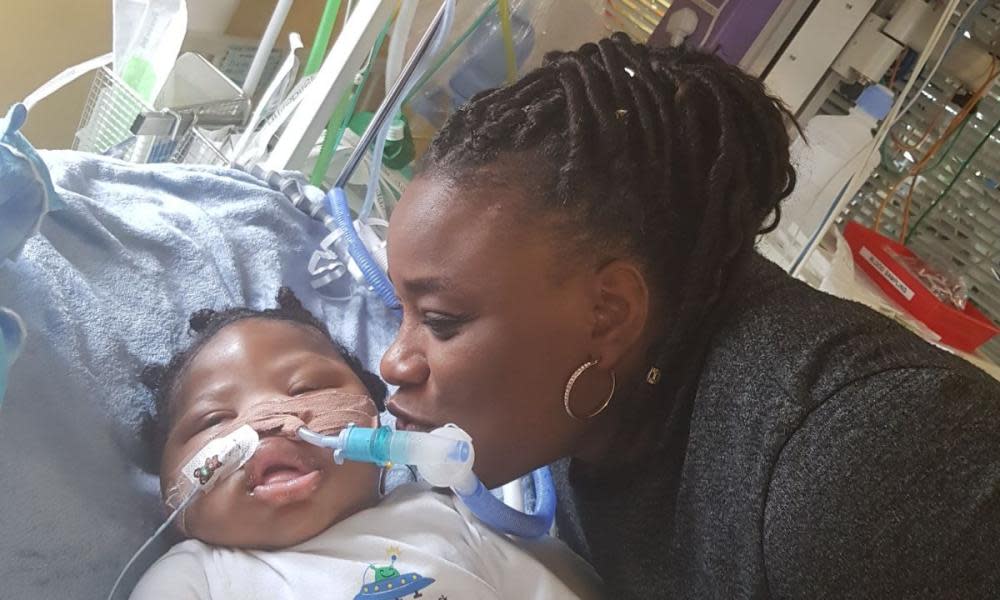My brain-damaged baby able to respond to me, mother tells court

The mother of a brain-damaged 11-month-old boy who is fighting to prevent doctors switching off his life support has told a court it was “not their decision to make” and that her son was able to respond to her voice and touch.
Specialists at King’s College hospital in London say giving further intensive care treatment to Isaiah Haastrup is “futile” and not in his best interests. They say the infant is profoundly brain-damaged, cannot move or breathe without assistance, is connected to a ventilation machine, may be experiencing pain and demonstrates no “purposeful” responses.
His mother, Takesha Thomas, said Isaiah “definitely has an emotional connection to me”. She told the high court in London that she seen him responding slowly through eye opening when she read to him, when she cuddled him and bathed him.
“When I call his name, I say: ‘Isaiah it’s mummy,’ he will also give me a response by opening his eyes,” she said.
Thomas and Isaiah’s father, Lanre Haastrup, a lawyer, both 36, from London, want life support treatment to continue in the hope they can bring Isaiah home, where he would require 24-hour intensive care. The court had heard he had “catastrophic” brain damage owing to oxygen deprivation at birth.
Asked by her barrister, Ian Wise QC, about doctors who believed Isaiah’s quality of life was so poor that life support should be withdrawn, Thomas told the family court hearing: “I don’t know how they come to that conclusion. I see a child that is injured. He needs love. He needs care, and I have it and can give it.
“For them [the doctors] to say it’s so poor it’s not worth living, that’s not right. That’s not their decision to make.”
Thomas said she did not agree with medical specialists who said her son was unresponsive. “I’ve learned how he responds and the way he responds.”
She added: “I am a good mother, and I can offer him love and with the right training I can help Isaiah in whatever way that I can”.
Speaking of her Christian faith, Thomas said it was God’s decision who lived and died. “I think everybody deserves the chance to live.”
Asked by her lawyer whether he son had a life worth preserving, she said: “Yes, I do,.”
Doctors and nurses only came to assess Isaiah “for two minutes and then they are gone”, she said. “I spend a lot more time with him.”
Thomas said the medics dismissed her. There was “mistrust” between the parents and hospital staff, the judge heard. “The more I say to them that I have seen Isaiah open his eyes, they will dismiss it and say it’s not. They are trying to say I’m not right,” Thomas said.
Cross-examined by Isaiah’s father, who is representing himself, Thomas said she had seen Isaiah move his head, blink, move his thumb and she could tell he really enjoyed being rocked and being in a baby bouncer. She agreed their son was brain-damaged, but said: “One of the things I live by is if you give a child love it will thrive.”
She also believed Isaiah cried, as his tongue quivered.
However, an expert medical witness said there was often “a mismatch between what parents perceive and what carers perceive to be purposeful responses.”
During his examination of Isaiah, he “did not see any objective evidence that he is aware”.
Movement did not equal purposeful response, and jaw-clenching and muscle-stiffening could be due to severe dystonia, which caused painful cramps, he said.
The “wealth of evidence” from the medical experts treating Isaiah concurred with his own opinion that there was “no purposeful responses evident to us when we have examined him”.
The case continues.

 Yahoo News
Yahoo News 
